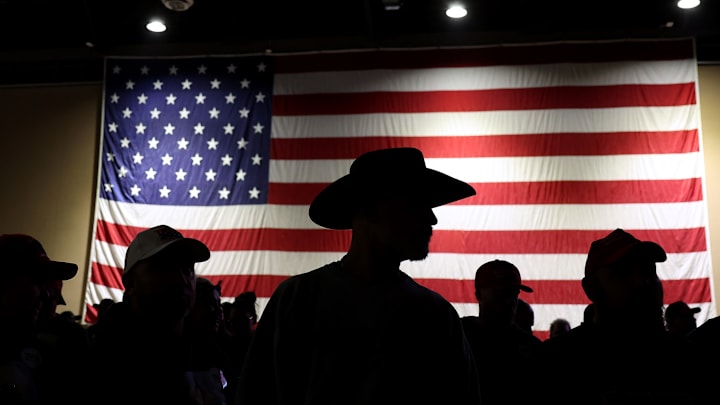Super Tuesday is imminent. This is the day that 16 states select their candidates for the upcoming presidential election. States select their candidates at different times, meaning Super Tuesday is the main event in a primary season that began in January and will run through to the middle of June. But you may have noticed that the selection process is sometimes referred to as a "primary," and sometimes a "caucus." Though primaries are now more common, this year, 13 states and territories will use a caucus to select the Republican nominee, while seven states and territories will use a caucus to select the Democratic nominee. The Nevada Republican Party famously holds both.
Firstly, what's the difference between a primary and a caucus?
Well, a primary is the more straight-forward of the two. A primary is what you think of when you think of an election. Though the exact process for primaries differs from state to state, generally in a primary voters select their preferred candidate using a ballot, and the candidate with the most votes wins the nomination. Primaries are run by the state government.
Caucuses, on the other hand, are run by the parties themselves, and while one can vote in a primary by mail, voting in a caucus requires in-person participation. Caucuses can be rowdy affairs, as opposed to the quiet polling places involved in primaries, as representatives of each nominee make speeches to sway voters, and the participants engage in debate.
Caucus formats differ from state to state as well: some hold secret ballots, while others vote with a show of hands. Either way, the votes are counted in full view of everyone in attendance, and the results are known immediately.
So, why would a state choose a caucus over a primary (or vice-versa)?
Both have their pros and cons. Caucuses are a form of democracy that would've been very familiar to the founding fathers. Participants are able to gauge the feelings of their friends and neighbors and have informed conversations before making a decision.
However, we live in a very different world than the founding fathers did. A greater value is placed on mass participation these days, and in modern times we expect that as many people as possible will be a part of the political process (ideally everyone would participate). You can imagine that a caucus would become impossibly chaotic with too many people in attendance.
With caucuses, the commitment required also represents a barrier to participation. A caucus can take hours, and participants must attend in-person, whereas voting in a primary is a simple matter of ticking a ballot sheet and dropping it into a box.
After the 2016 election, the Democratic National Committee declared that primaries were preferred and that any state that continued to use caucuses must streamline the process to make it simpler and more accessible. Iowa Democrats initially planned to hold a "virtual caucus," in which participants who could not be there in person could call in their votes. The plan was scrapped, due to technology concerns, but an app was developed to streamline the voting process and ensure that the multiple caucuses held across the state could quickly compile results. However, the app failed and results were not concluded until more than three weeks after caucus night.
So why would Nevada hold both a primary and a caucus?
After the 2020 election, Nevada's Democratic-controlled legislature elected to switch from caucuses to primaries, but the state Republican party objected, due in part to misinformation about mail-in votes leading to voter fraud. And the Nevada Republicans elected to continue with caucuses, only holding an obligatory primary. The Nevada Republican rules stated that a candidate could compete in the caucus or primary, but not both, leading to the bizarre situation where Donald Trump ran virtually unopposed in the caucuses, while his one remaining viable opponent, former ambassador Nikki Haley, ran in the primary.
In another quirk of Nevada's electoral system, voters in the primary were given the option of voting for "none of these candidates," so while Haley handily beat the other candidates in the primary, she embarrassingly came in a distant second to no one.
The confusing situation in Nevada was at least partially a result of misinformation, and resulted in more misinformation. There were variously reports that Trump was absent from the Nevada primary ballot either because his campaign had forgotten to file the paperwork, or because the system was rigged against him. Neither is true. Nevada has pledged its delegates to the winner of the caucus, so Trump is the Nevada Republican's choice for candidate.
Got questions about history, trivia, or anything else? Send an email to askeverest@fansided.comand we might answer here on the site!
